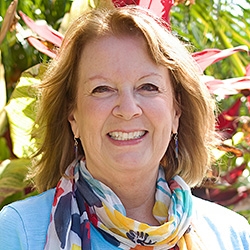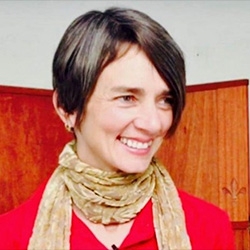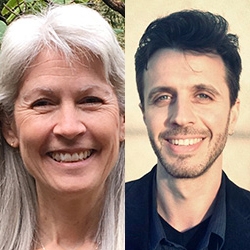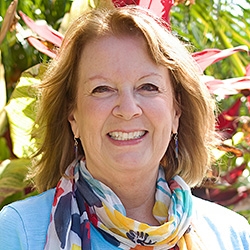
Search Results: dependence
-
LoraKim explores what gets in the way of seeing the inherent worth and dignity of others when there is conflict in congregations. The strategies LoraKim offers can be applied to any spiritual community.
-
Developing interpersonal relationship skills in congregations is integral to working with the conflicts that arise. These skills can be applied to any spiritual community.
-
Miki responds to a participant’s question concerning fear of consequences when speaking with a manager at work. In this excerpt, she delves into the topic of choosing to inhabit nonviolence in the workplace, affirming that fear and nonviolence are incompatible, and that nonviolence is a powerful alternative to our habitual Fight, Flight, Freeze responses.
-
When someone expresses upset about our actions, and we focus on our intention being seen and understood (e.g. "I didn’t mean to hurt you”) it doesn't support the speaker in being heard more deeply with care. Here we'll explore this dynamic in a way that supports more clarity and the possibility of greater personal liberation. Read on for more.
-
- Learn concrete tools for engaging with others as you embrace individual and collective liberation
- Find your own source of choice even in the face of challenges
- Release the constriction of scarcity
- Find an empowered option to respond to what is happening in our world
- Open the door to the possibility of thriving rather than merely surviving
-
By focusing on NVC process and practice without factoring in the interdependent, systemic dimension we unwittingly diminish the power of NVC. We reinforce the dominant paradigm, rather than challenging it -- making NVC one more tool for compliance. NVC principles can turn against its own purpose in cruel ways. NVC could also empower social change. We'll need our attention on this matter if we are to contribute to transforming the oppression we face and our collective march towards extinction.
-
Trainer Tip: Censoring oneself to maintain peace may seem easier, but it actually requires significant energy. You can free up that energy you use to deny and stuff down your feelings, needs, desires, truth, and figure out and adjust to what others want. Embracing authenticity and expressing true feelings and needs can lead to a liberating experience, unlocking joy, love, and endless possibilities.
-
Praise may disconnect us from our own confidence, intrinsic motivation, or discernment. It may lead to perfectionism, people pleasing, codependency, a tendency to criticize others or fix others, and more. Instead, without evaluative words we can sincerely share what we specifically liked about what they did, and what needs were met for us.
-
Because we affect one another it can be hard to know where to take responsibility and where to leave it with the other person. This means we need self empathy, and presence for another's struggles without compulsion to "make them happy" or bring them healthy change. You can then attend to the needs and to your choice about if and how you want to contribute with compassion. Respect them as autonomously in charge of their unique process of change. With this, you honor your life and theirs. And where, what, and how you will invest your precious life energy.
-
Setting boundaries takes being firmly grounded in self-respect and clear about what works for you. This means making conscious choices about how you relate to another or behave in a situation. Such clarity allows you to put your attention and energy where you want it to go. Thus we can have care and compassion without taking responsibility for others, nor feeling guilty when we say “no”. This takes awareness, skills, practice, healing and compassion.
-
During the holiday season we may find ourselves taking responsibility for other's feelings, which can lead to guilt, shame, depression, and resentment. These feelings are exacerbated by the habitual pattern we call the "Vortex of Submission" (being hooked by a sense of duty and obligation). Read on for ways to recognize and break the pattern.
-
In order to bring in more nonviolence into the world, we need to take our own needs seriously and recognize that no amount of seeing someone’s innocence would mean putting up with more of their harmful behavior. We need to disentangle compassion towards another from the willingness to tolerate more harmful actions. At times this means finding enough self-love, support, or clarity, to take decisive action. Read on for more.
-
Notice situations where you're attending to another and giving up on your needs with resentment or a sense of submitting. You can also watch for “shoulds,” obligation, and black-and-white thinking around the support you offer. Is there a sense that if you don't carry out a particular action something bad will happen? If so, identify the needs at hand and brainstorm a variety of strategies to meet them.
-
Is it tough to see a loved one go through hardship? May you have tension building up inside and draw a rigid boundary, or feel the urgency to swoop in and try to “rescue” them with advice, consoling, cheering up, analyzing, or explaining? Instead, relax your body. Invite your emotions to flow with acceptance. Notice inner peace and expansion. See this person as someone on a journey to awakening with all its painful and joyful twists and turns.
-
In this book excerpt, Kathleen and Jared offer a path to reach deeper clarity, distinguishing between universal needs and strategies.
-
- Celebrate and nurture your relationship to the Earth — and each other!
- Explore your connections to family, partner, work, nature, self and more
- Discover new ways to grow in community and work together to make this world a better place
- Engage and immerse yourself in NVC while making new friends!
-
When we have privilege, we can have access to resources resulting from legal or social norms related to membership in a group -- independent of any (in)action, awareness of the disparity, the potential benefits to us, or the costs to others. Unhelpful ways of engaging with privilege are: denial/invisibility, guilt/shame, defensiveness, and entitlement. Helpful ways of engaging are: owning privilege, learning about privilege, opening to feedback, and stewarding privilege for benefit of all. To be helpful we need to engage with necessary (rather than unnecessary) discomfort.
-
A chosen, interdependent world… In most cases, that's sure not the world we live in today, is it. But it could be the world we live in tomorrow. And you can choose to be part of bringing that better world to life – to be part of a gradual, joyful transformation – simply by using the dynamic, living power of Dialogue.
-
While so many of us know how close we are to the edge of global catastrophe and want change, what makes the existing global system continue to function with our ongoing participation? Read on for more on the challenges and path towards learning to steward life and all the resources of this one planet for the benefit of all.
-
Trainer Tip: When we love a child there's a contribution we can provide in helping them go their own way successfully, in big ways and small.


















